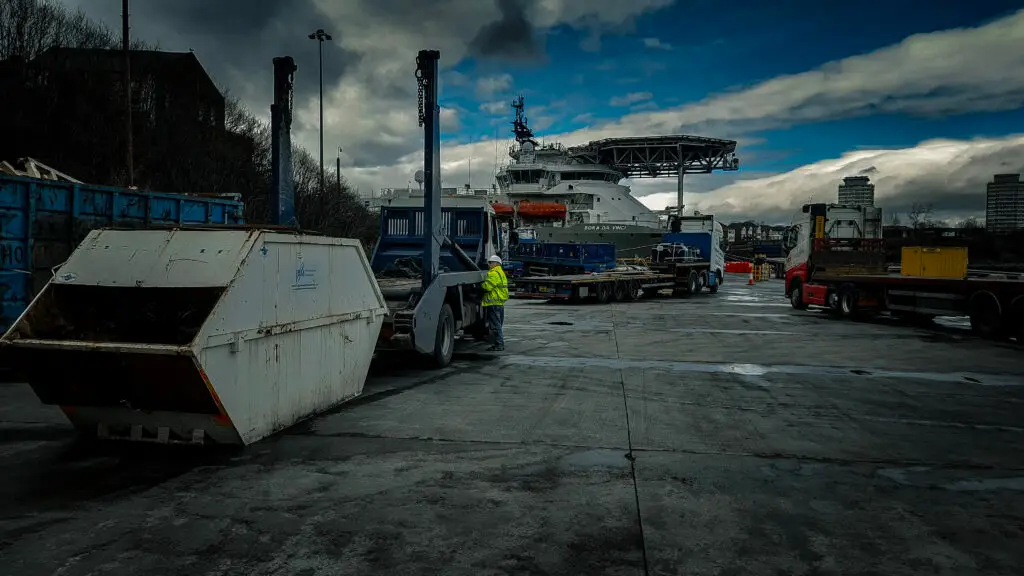The oceans cover more than 70% of our planet, which is crucial in maintaining life on Earth. They regulate climate, support diverse ecosystems, and provide resources essential for human survival. However, they face significant threats from pollution and improper waste disposal, particularly in offshore environments. Offshore waste management is vital in preserving marine ecosystems and preventing pollution. At JBM Environmental Services, we are dedicated to implementing effective waste management solutions, including our recent projects at the Dogger Bank Wind Farm.
What is Offshore Waste Management?
Offshore waste management involves collecting, treating, and disposing of waste generated by offshore activities such as oil and gas drilling, maritime transport, and renewable energy projects. This process ensures that harmful substances do not enter the marine environment, protecting both aquatic life and human health. It encompasses a range of practices and methodologies designed to handle various types of waste in challenging offshore conditions. Here are key aspects of offshore waste management:
Waste Identification and Classification:
- Hazardous vs. Non-Hazardous Waste: Offshore waste is categorised into hazardous and non-hazardous types. Hazardous waste includes substances that are flammable, corrosive, toxic, or reactive, such as chemicals, oil, and drilling fluids. Non-hazardous waste includes items like food waste, packaging materials, and general refuse.
- Waste Streams: Identifying different waste streams is crucial for effective management. Common waste streams in offshore operations include solid waste, liquid waste, gaseous emissions, and sludge.
Waste Segregation and Storage:
- Onboard Segregation: Waste is segregated onboard vessels and offshore platforms to ensure proper handling and disposal. This includes using designated containers for different types of waste.
- Temporary Storage: Due to the remote nature of offshore installations, temporary storage solutions such as sealed containers and waste skips are used to store waste safely until it can be transported to onshore facilities.
Waste Treatment Techniques:
- Physical Treatment: Methods such as shredding, compacting, and dewatering are used to reduce the volume of waste and make it easier to handle.
- Chemical Treatment: Chemical processes are used to neutralise hazardous substances, making them safer for disposal. This includes processes like chemical precipitation and oxidation.
- Biological Treatment: Biological processes, such as bioremediation, use microorganisms to break down organic waste and contaminants.
Waste Disposal Methods:
- Landfilling: Non-hazardous waste that cannot be recycled is often sent to landfills. Strict regulations govern the disposal of waste in landfills to prevent environmental contamination.
- Incineration: Hazardous waste is often incinerated at high temperatures to reduce its volume and destroy harmful substances. Incineration ash must be handled and disposed of carefully to avoid contamination.
- Ocean Disposal: In some cases, treated waste may be disposed of in the ocean under strict regulations to ensure it does not harm the marine environment. However, this practice is heavily regulated and often discouraged in favour of more sustainable methods.
Recycling and Resource Recovery:
- Material Recovery: Offshore waste management aims to recover valuable materials from waste streams whenever possible. This includes metals, plastics, and other recyclable materials.
- Energy Recovery: Waste-to-energy technologies convert waste materials into usable energy, such as electricity or heat, reducing the amount of waste sent to landfills and lowering the environmental footprint.
Compliance and Monitoring:
- Regulatory Compliance: Offshore waste management must comply with various international, national, and regional regulations. Companies must stay updated on regulatory changes and ensure their practices meet or exceed these requirements.
- Environmental Monitoring: Continuous monitoring of waste management practices and their impact on the environment is essential. This includes tracking waste generation, treatment, and disposal processes to identify areas for improvement and ensure compliance with environmental standards.
Training and Awareness:
- Employee Training: Offshore personnel are trained in waste management best practices, including waste segregation, handling hazardous materials, and emergency response procedures.
- Awareness Campaigns: Raising awareness about the importance of waste management and its impact on the environment helps foster a culture of responsibility and sustainability among offshore workers.
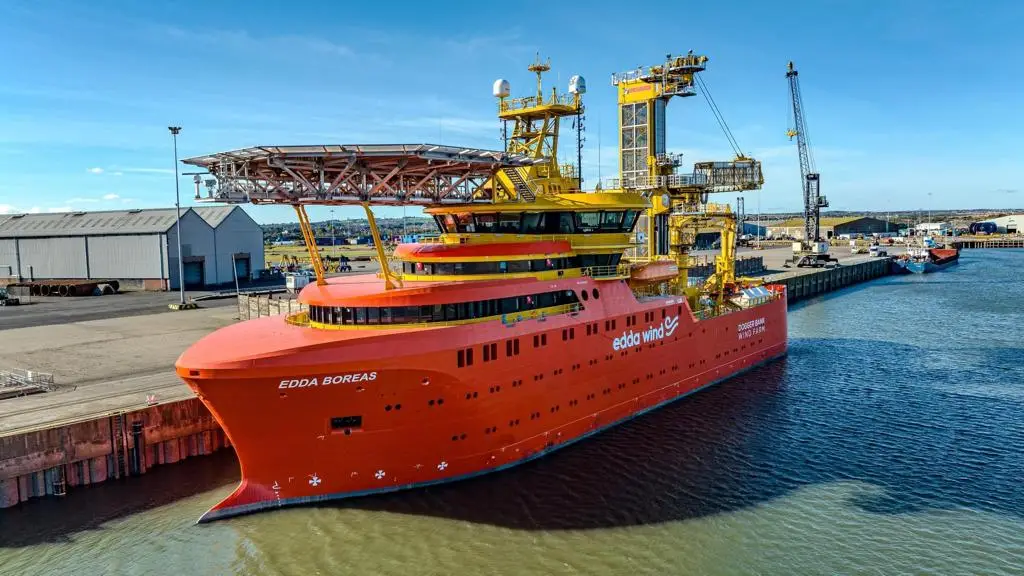
The Environmental Impact of Offshore Waste
- Pollution: Offshore activities can produce various types of waste, including plastics, chemicals, and heavy metals, which can be detrimental to marine life if not properly managed. Pollutants can cause long-term damage to marine habitats and enter the food chain, impacting human health.
- Marine Debris: Improper disposal of waste leads to marine debris, which can harm marine animals through ingestion or entanglement. Plastics, in particular, break down into microplastics, which are ingested by marine organisms, leading to physical harm and chemical exposure.
- Ecosystem Disruption: Toxic waste can disrupt delicate marine ecosystems, affecting the food chain and biodiversity. For example, oil spills can devastate coral reefs and mangroves, essential breeding grounds for many marine species.
Legal and Regulatory Framework
The UK has stringent regulations governing offshore waste management to protect the marine environment. These include:
- MARPOL Convention: International regulations to prevent pollution from ships, covering oil, chemicals, sewage, garbage, and emissions.
- OSPAR Convention: Protects the marine environment of the North-East Atlantic, focusing on reducing pollution and conserving biodiversity.
- UK Environmental Protection Act: National legislation that governs waste management practices, ensuring compliance with environmental standards.
Compliance with these regulations is critical for any offshore operation, and failure to adhere can result in severe penalties and damage to a company’s reputation.
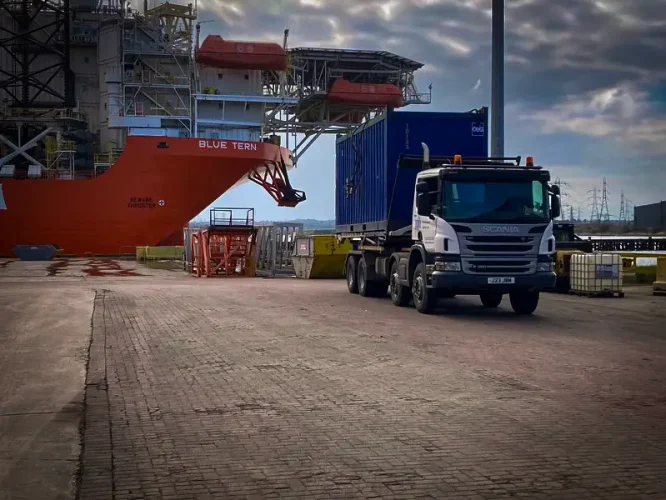
The Role of JBM Environmental Services
At JBM Environmental Services, we offer comprehensive waste management solutions to mitigate the environmental impact of offshore activities. Our services include waste collection, treatment, recycling, and safe disposal. We are committed to:
- Sustainability: Promoting practices that reduce environmental impact and support the circular economy.
- Innovation: Implementing advanced technologies for efficient waste treatment and recycling.
- Compliance: Ensuring all operations meet or exceed regulatory requirements.
Case Study: Dogger Bank Wind Farm
The Dogger Bank Wind Farm is one of the largest offshore wind farms in the world, located off the coast of Yorkshire. Managing waste for such a significant project requires meticulous planning and execution. JBM Environmental Services is proud to provide waste management solutions for this landmark development.
- Waste Collection and Segregation: We ensure all waste generated during the construction and operation phases is collected and segregated correctly to facilitate recycling and disposal. This involves the use of specialised containers and equipment to handle different types of waste.
- Recycling Initiatives: Our recycling initiatives aim to minimise waste sent to landfills, promoting a circular economy. We recycle materials such as metals, plastics, and glass, reducing the environmental footprint of the wind farm.
- Hazardous Waste Management: Handling hazardous waste, such as chemicals and oils, requires specialised techniques to prevent environmental contamination. We use state-of-the-art technology to treat hazardous waste, ensuring it is rendered harmless before disposal.
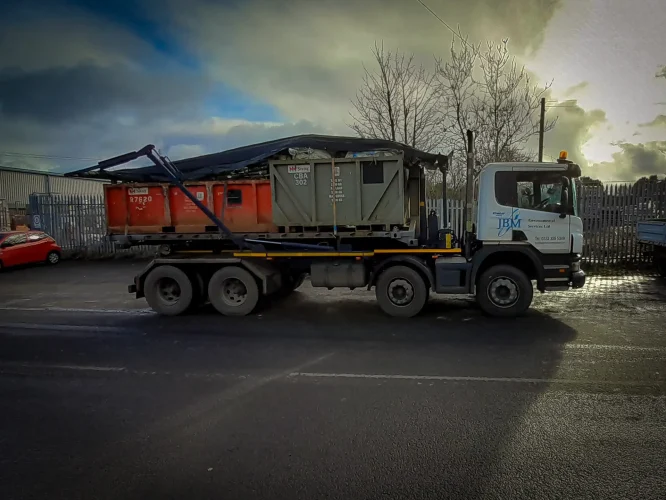
Innovative Solutions in Offshore Waste Management
JBM Environmental Services is at the forefront of innovative waste management solutions. We utilise advanced technologies to treat and recycle waste, ensuring minimal environmental impact. Some of our innovations include:
- Bioremediation: Using biological processes to treat contaminated waste and restore natural environments.
- Thermal Treatment: Employing high-temperature processes to treat hazardous waste and convert it into harmless byproducts.
- Smart Waste Monitoring: Implementing IoT (Internet of Things) technologies to monitor waste levels and optimise collection schedules.
Benefits of Effective Offshore Waste Management
- Protecting Marine Life: Proper waste management reduces the risk of pollution and protects marine species from harmful substances. This helps maintain biodiversity and ensures the survival of endangered species.
- Sustaining Ecosystems: Maintaining clean and healthy oceans supports diverse marine ecosystems and their intricate food webs. Healthy ecosystems are more resilient to environmental changes and provide essential services such as carbon sequestration.
- Compliance and Reputation: Adhering to environmental regulations enhances the reputation of offshore industries and demonstrates corporate responsibility. Companies that prioritise environmental stewardship are more likely to gain public trust and support.
Challenges in Offshore Waste Management
- Logistical Issues: The remote locations of offshore installations pose challenges for waste collection and transportation. Adverse weather conditions and limited access can complicate waste management efforts.
- Technological Limitations: Developing and implementing technologies for waste treatment in offshore environments can be complex and costly. Continuous investment in research and development is necessary to overcome these challenges.
- Regulatory Compliance: Navigating the various international and national regulations requires expertise and diligence. Companies must stay informed about regulatory changes and ensure their practices remain compliant.
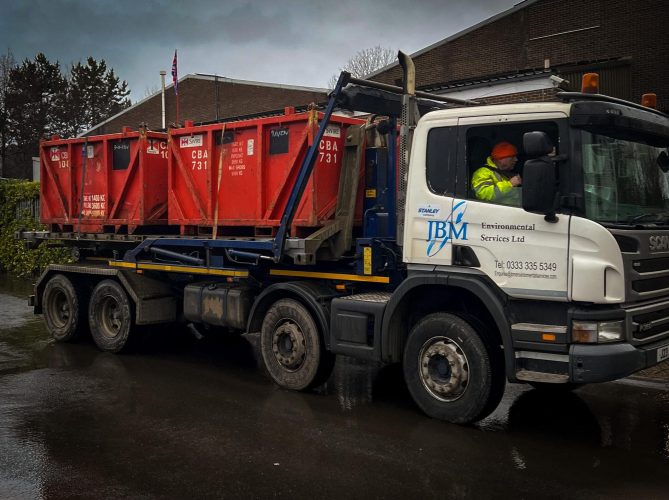
The Future of Offshore Waste Management
As offshore activities continue to expand, so does the need for effective waste management solutions. JBM Environmental Services is committed to advancing our methods and technologies to meet future challenges. Our goal is to set industry standards in environmental protection and sustainability. Future trends may include:
- Increased Use of Renewable Energy: Offshore wind and solar energy projects will require specialised waste management solutions.
- Enhanced Recycling Techniques: Developing more efficient recycling methods to handle complex waste streams.
- Collaborative Efforts: Partnering with other organisations and stakeholders to develop comprehensive waste management strategies.
Conclusion
Offshore waste management is crucial for the preservation of our oceans and the protection of marine life. JBM Environmental Services is dedicated to providing top-tier waste management solutions, exemplified by our work at the Dogger Bank
Tel:0333 335 5349 Email: [email protected]
Share This Post!
Share this blog post on your social media channels and join us in our mission to protect the environment from waste.
